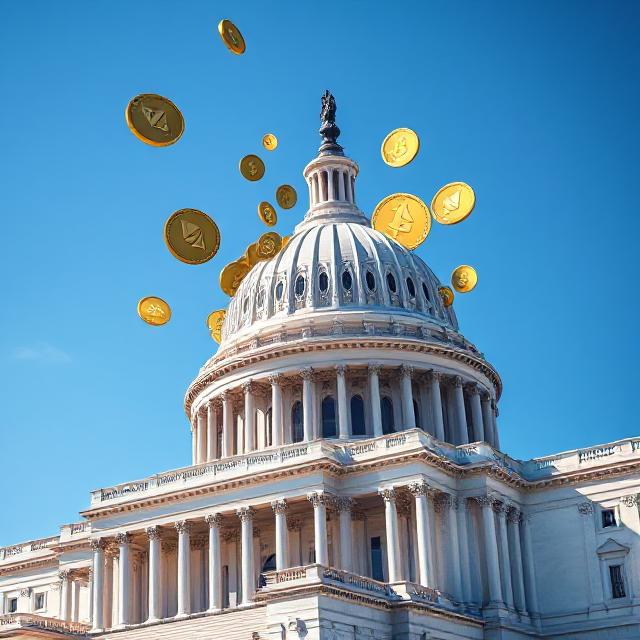
TL;DR
- President Trump is signing the GENIUS Act, America’s first crypto law.
- CLARITY Act lays groundwork for digital asset classification.
- House passes anti-CBDC bill; Senate fate unclear.
- Ethereum and Bitcoin surge, ETH tops $3,500.
- Coinbase, CME, and PayPal make headlines amid fast-paced crypto week.
U.S. Congress Passes Groundbreaking Crypto Legislation
The U.S. House of Representatives has passed a landmark package of cryptocurrency legislation, culminating in the GENIUS Act, the country’s first-ever federal crypto law. At 2:30 PM ET, President Donald Trump is scheduled to sign the bill, marking a historic shift in how digital assets are regulated at the national level.
The GENIUS Act (Governing Electronic Networks for Issuance of U.S. Stablecoins) primarily focuses on regulating stablecoin issuance. The law equates blockchain-based payment infrastructure with existing financial networks like SWIFT, signaling a broader acceptance of decentralized finance in traditional policy circles.
U.S. Crypto Legislation Milestones
| Bill Passed | Scope | Status |
| GENIUS Act | Stablecoin regulation | Signed by Trump (July 18, 2025) |
| CLARITY Act | Digital asset classification | Passed House, pending Senate |
| Anti-CBDC Bill | Prohibits U.S. CBDC issuance | Passed House, uncertain Senate |
CLARITY Act: Defining Crypto’s Legal Nature
In addition to GENIUS, lawmakers passed the CLARITY Act—a major bill that outlines whether a digital asset is a security or a commodity. While not finalized, the legislation has attracted bipartisan momentum.
Senator Tim Scott, chair of the Senate Banking Committee, called the House version a “solid first draft” and expressed hope for a finalized law before September 30. The Senate Agriculture Committee, which oversees the CFTC, will also play a pivotal role in shaping the final version.
Anti-CBDC Bill Adds Political Complexity
Another bill passed this week prohibits the launch of a U.S. central bank digital currency (CBDC). Spearheaded by House Assistant Leader Tom Emmer and backed by the Freedom Caucus, the bill was added strategically to bring broader legislation to the House floor.
While it passed the House, its future in the Senate remains uncertain, especially given its polarizing nature within fiscal policy circles.
Crypto Markets React: Ethereum and Bitcoin Rally
The crypto market responded favorably to the week’s regulatory news. Ethereum surged past $3,500, up from under $1,500 in April, driven by ETF inflows and several treasury adoption announcements.
Bitcoin also reached all-time highs, reflecting renewed institutional confidence. Layer-1 blockchains like SUI, SEI, and Solana also posted weekly gains, while memecoins declined, indicating investor migration toward utility-driven ecosystems.
Coinbase, CME, and PayPal Stir Ecosystem Buzz
Several top firms made headlines this week:
- Coinbase released a new “app for everything”, aiming to centralize DeFi, custody, and trading.
- CME Group announced it’s exploring 24/7 crypto futures/options trading, though excluding memecoins.
- PayPal lost its blockchain lead, José Fernández da Ponte, who joined Stellar in a surprise move.
Meanwhile, Trump authorized crypto investments for retirement accounts, expanding crypto’s presence in long-term savings plans.
Legal and Political Tensions Continue
In the courts, Roman Storm, co-developer of the Ethereum-based mixer Tornado Cash, began his criminal trial in Manhattan. Cheyenne Ligon covered the proceedings in detail, emphasizing its implications for open-source privacy protocols.
Simultaneously, Trump renewed efforts to remove Federal Reserve Chair Jerome Powell, creating friction between the White House and central bank governance—a situation that could shape monetary policy around digital assets in coming months.
Final Thoughts: What Comes Next?
With Congress entering summer recess, momentum for crypto legislation may temporarily slow. But regulatory agencies, corporate actors, and market innovators show no signs of pausing.
This week’s developments represent a tipping point for U.S. crypto policy. After years of indecision, clear legal frameworks are finally materializing, with stablecoins, asset classification, and digital sovereignty at the forefront.






